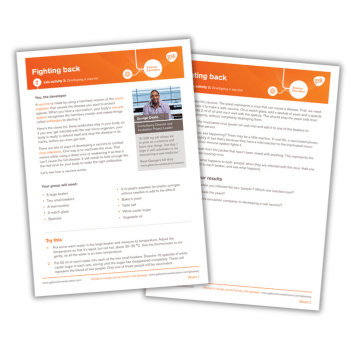Physics teacher – Why you should give teaching physics a go

Kit Betts-Masters shares the details of how he got into physics teaching, and explains why others should consider doing the same…

- by Kit Betts-Masters
- Science educator, physics specialist and content creator Visit website

Alright, I admit it. physics is weird. Which, by extension, surely makes us physics teachers a special bunch.
A very different subject from ‘the other two’, looked at in a different way it’s not weird at all. In fact, it’s the most beautiful, elegant subject there is, with pure and calculable outcomes to challenging problems. It’s amazing and I love it.
Content and application
As the sole physics teacher in most of the schools I’ve worked at, it’s been a lonely role. And a high pressure one, too.
But at the same time, I’ve valued being placed in a position of trust and the considerable amount of autonomy I’ve been granted throughout my career. For that reason alone, I wouldn’t have done anything differently.
I started teaching physics out of necessity. At my first school, they had no one. Having previously earned 120 engineering credits in my architecture degree, I decided to put my hand up and said, “I’ll give it a go.”
“I started teaching physics out of necessity”
Later, after I heard the school’s head of science say, “We’re really glad you’re here,” and one of the students say, “Thanks for teaching us, Sir,” I became hooked. That student’s an architect now.
How to be a physics teacher
If your school needs a physics teacher, you should think about giving it a go. The best way to get started is to complete a subject knowledge enhancement course, such as those offered by the Institute of Physics (IoP).
These can take you through all you need to know to become a GCSE or A Level physics teacher. It is challenging, though. You need to be honest with yourself, because physics is hard.
Preparing for lessons requires you to master both the course content and its application. In day-to-day teaching you’re constantly in situations where you need to think hard about how to explain the concepts and how to reach the solutions.
But as I say to my students, those things which are hard to understand are often the most interesting…
Resources for physics teachers
Luckily, the resources out there to help you are incredibly rich. I’d strongly suggest following a high quality scheme of work and reading it closely. There’s great value to be had in their explanations of how to convey ideas.
In time, you’ll develop the wisdom needed to discern where students are getting hung up, and where misconceptions might be coming from.
Again, the IoP is a wealth of knowledge in this area. You can also count on there being an amazing online community sharing plenty of advice and resources, plus lots of help available from experts who’ll be willing to answer any questions without patronising you.
“You can also count on there being an amazing online community sharing plenty of advice and resources”
It might not surprise you to learn that science teachers’ jokes aren’t especially strong. One favourite of mine is “If it moves, it’s biology; if it stinks, it’s chemistry; and if it doesn’t work, it’s physics.”
Because yes, there have been numerous situations in my career when I’ve struggled to get experiments doing what they’re supposed to do. I’ll happily admit that on a few occasions, I’ve not succeeded at all.
And yet, more often than not, with a bit of research, some hard work and determination – as well as close collaboration with our science technicians – we’ve managed to get things going and produce results that are in line with the physical laws we’re trying to demonstrate to our students.
And if, for all your efforts, that particular practical is simply a non-starter, you can always turn to some excellent computer simulations.
You’ll be surprised at how much students can enjoy the process of acquiring large data sets and analysing them with the aid of computer spreadsheets.
How to be a good physics teacher
With all that said about how challenging it is to be a physics teacher, be aware that the most important thing to get right isn’t that hard at all – namely, getting young people enthusiastic about physics.
I can still remember interviewing for my first role as head of physics. The other candidates had been complaining that the interview lesson concerned the ‘dry’ topic of thermal physics.
In my lesson, I included an explanation of how fridges and steam engines work. I might have thrown a breakdown of rocket propulsion in there too.
And I knew my lesson was going to be fascinating, and that I would get the job. Because there are so many ways of making students fall in love with physics.
Trending
“There are so many ways of making students fall in love with physics”
Successive cohorts are consistently amazed at what we’re able to do in the lab. That might be measuring gravitational acceleration, getting close to Planck’s constant or estimating the age of the universe.
People will embrace you as the one person who knows how to use the data logging set. You’ll come to be known as the only one able to obtain accurate results from the ageing set of radioactive sources in your lab, and getting the spark counter or electron beam to actually work.
Getting your class excited
When you can get these things right, students and staff alike will treat you like a magician. But then, you’re also half-expected to be the slightly unhinged teacher out there on the playing fields, launching parachutes or tasking their class with measuring the speed of sound.
Or indeed launching projectiles around gym when teaching about energy, accuracy or Hooke’s Law. Anything to get your classes excited about what we all know, deep down, is the coolest of the sciences…
You’re the one leading trips to the Space Centre, master classes at top universities or voyages abroad to CERN and Iceland.
You’re at school some evenings, with a class on the school roof (architecture and risk assessments depending), looking through a telescope or even launching rockets into space.
I love teaching physics, and all of what I’ve described is possible for you to experience too. It’s a great job to have within a school – perhaps even the best.
Common issues in A-level physics lessons
Here are five common issues I see students struggling with in A-level practical physics lessons, and what you can do about them…
1 Inexperience
The pandemic-era school closures, coupled with the ways science is now taught, means that your students will have less experience conducting practicals.
Try to use more frequent, more simple practicals to improve their problem-solving and equipment handling skills.
2 Group work
In a similar vein, you may well find that your students are relatively unfamiliar with participating in group work.
Address this by actively involving them in your own demonstrations, so that you can model the skill of teamwork.
3 Information overload
Some students can struggle with following the complex written methods often found in physics teaching.
Where possible, break down your practical delivery into multiple lessons, beginning with a group reading and demonstration of the method.
4 Unrealistic expectations
This is something I personally suffer from a great deal. You need to accept that some students might not complete every variation of an experiment.
Try dedicating separate lessons to explanation, setup, data collection and analysis. (You can still allow time for extending the practical, for the benefit of more enthusiastic and capable group members.)
5 Preparation and equipment
Involve your technicians in the setting up of demo sets beforehand. Allow yourself enough time to go through the method and anticipate any issues they might have, such as faulty equipment.
It might even be something as simple as keeping key equipment in place while performing some other action with your hands.
Try to then allocate time for a preliminary test to take place before the data collection lesson itself.
Kit Betts-Masters is a lead practitioner for science and produces physics, education and technology videos for YouTube. For more information, visit evaluateeverything.co.uk







